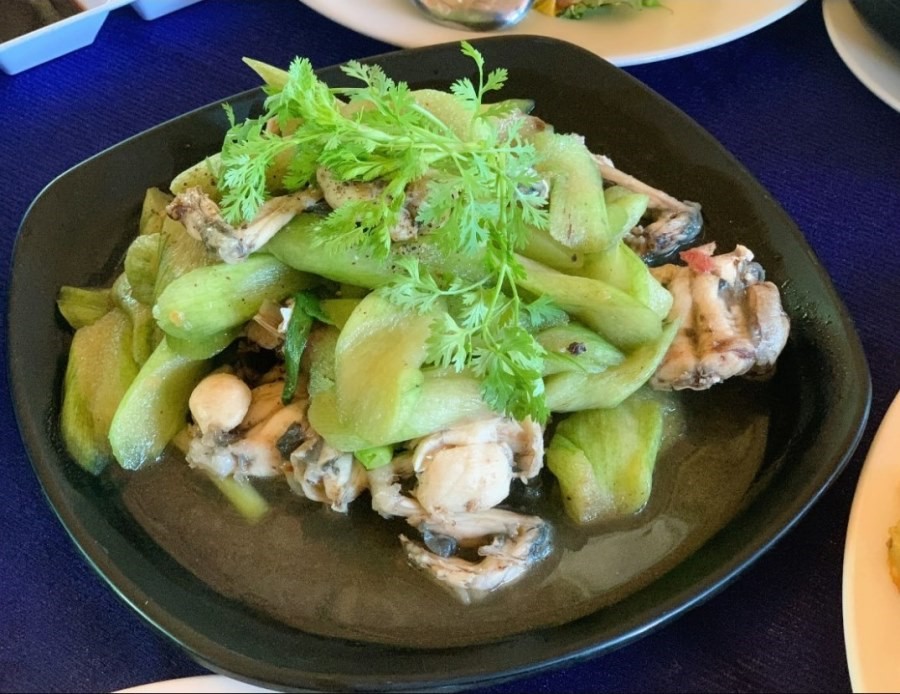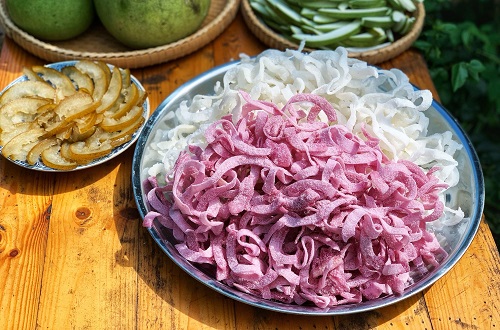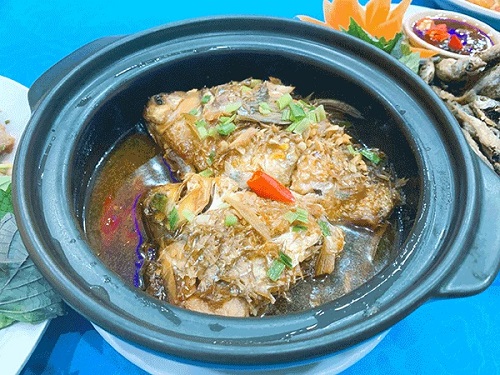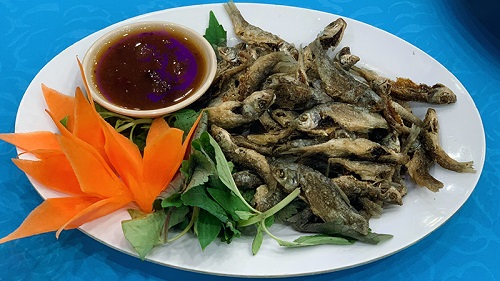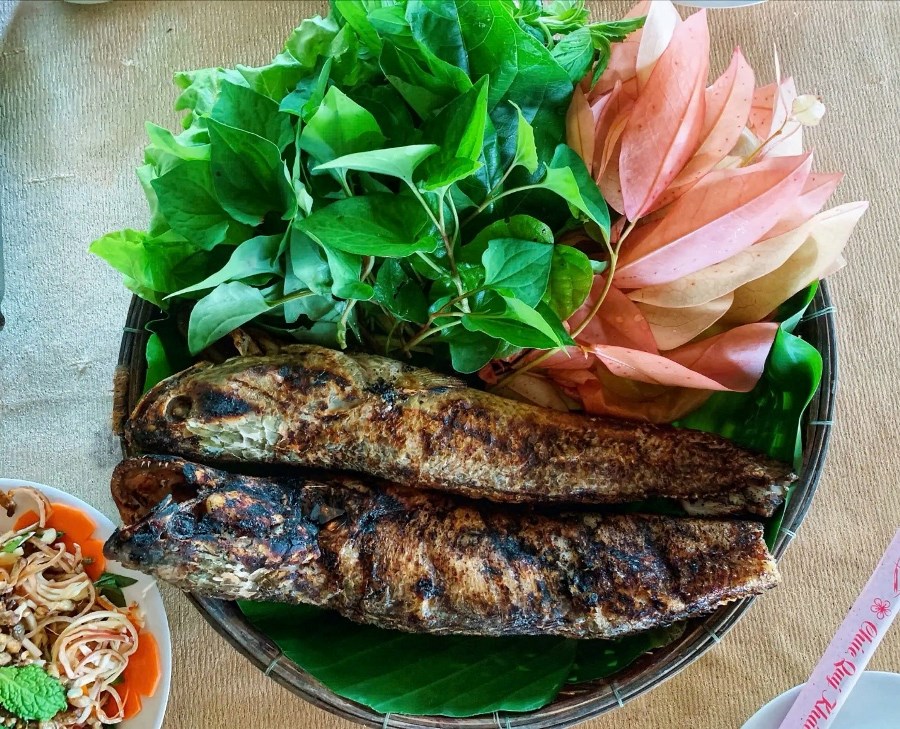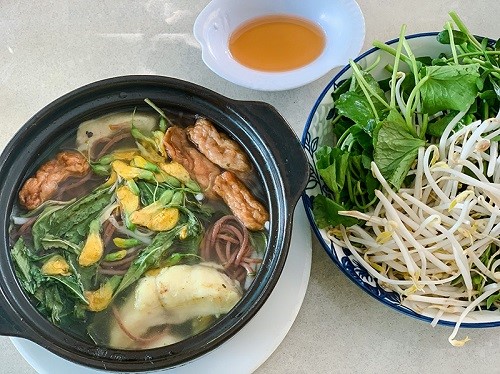
Kitchen God altar
Customarily, Kitchen Gods include Táo quân, Táo bà and Táo tướng (Land Genie). Táo quân, Táo bà were appointed Kitchen Gods or Phật Táo to represent the Jade Emperor on earth. Land Genie, commonly known as Thổ Táo, is in charge of the kitchen fire. There is an old saying that
“Hăm ba Phật Táo về trời,
Thổ Táo ở lại đội nồi suốt năm”.
(“On 23rd, Phật Táo returns to the Heaven,
Here Thổ Táo works all year round.”)
Táo Quân is so-called Tư Mạng Táo Quân or Ðịnh Phước Táo Quân. Considered as the head of the family, Kitchen Gods supervise every thought and behavior of the family members. For that reason, they are worshiped in the most solemn place. According to Southern Vietnam customs, the ancestors' altar in a three-compartment house must be placed on both sides, and the central space is available for worshiping Quan Thánh Ðế Quân (middle), Ðông Trù Tư Mạng Táo Phủ Thần Quân (left), and Thổ Ðịa Phước Ðức Chánh Thần (right). In particular, Land Genie, or Hỏa Ðức Táo Quân, who supervises the fire, is worshiped in the kitchen. Land Genie worship is simpler than that of the Kitchen Gods. Unlike the Kitchen Gods’ altar, Land Genie’s is a bamboo tube placed next to the wood-burning stove used as a holder to burn incense in remembrance. Formerly, a lot of families worshiped Kitchen Gods in two separate spots. Later, they found the high altar inconvenient, so they worshiped all Kitchen Gods on one altar in the kitchen. However, some families in the countryside have so far worshiped the Kitchen Gods in the front of the house (1).
These days, the Kitchen God altar is a short plank normally hammered into a column. Some urban dwellers have a ready-made altar screwed to the wall in the kitchen. On the altar lies an incense burner. On the column is a glass frame of a red paper sheet with four large Chinese characters written “Ðịnh Phước Táo Quân”. The two smaller couplets on both sides are also written in Chinese: “Hữu đức năng tư hỏa / Vô tư khả đạt thiên” meaning “With virtue, he can control fire / With a carefree heart, he can reach the Heaven.”

Kitchen God joss paper
Kitchen Gods are in charge of, firstly, keeping up the kitchen affairs and fire and blessing human lives; secondly, recording family activities throughout the year and reporting to the Jade Emperor. Based on that report, the Jade Emperor will determine to bless or punish each household.
Therefore, “The Fire of the Kitchen Gods is positive and useful which has been supervised by the Gods. Therefore, the Kitchen Gods look after kitchen affairs and the fire of the household. Gradually, Kitchen Gods are considered as the top-tier blessing god with the title of Ðông Trù Tư Mạng Táo Phủ Thần Quân. Kitchen Gods are responsible for recording and reporting the merits and sins of the owner (and family members) to the Jade Emperor in order to bless and punish the family. Kitchen God worshiping custom highlights Bà Táo (also called God with a mark to differentiate from Ông Táo (Ông Táo/Ông đầu rau) made of clay or ceramic with a navel). The wood-burning stove is personified as Bà Táo, Mother of Fire” (2).
Kitchen God worshiping ceremony
In addition to offering incense to the Kitchen Gods every day to pray for their well-being and peace, people have the biggest Kitchen God ceremony of the year to farewell them to Heaven on the 23rd of lunar December.
Offerings to the Kitchen Gods consist of fruits, pantries, candy, pork, tea, wine, joss paper, stork, and horse-printed paper which people believe that “the animals bring Kitchen Gods to the Heaven.” It is said that “Gods ride horses and storks to the Heaven. It originated from the sacrifice ritual according to Taoist practice and Buddhist sutra. This ritual is performed at the end of the sacrifices. People put paper horses and cranes stuffed with all the reports on the altar. By burning the paper animals, people believe the reports are sent to those in the three realms.”(3). In some localities, people place the wood-burning stove (karan) in the yard and add a pinch of rock salt. The crackling is believed to get rid of all bad luck and welcome fortune and fulfillment for the year to come.

Countryside kitchen and Kitchen God worship engraved on Southerners’ hearts. In the photo, the children and the pot full of Banh Tet (cylindric glutinous rice cake) on the last day of the lunar year. Photo: Duy Khoi
On the one hand, “the Kitchen God worship in Vietnam preserves the early custom of the God of Fire worship. On the other hand, the integration of foreign beliefs has gradually turned the Kitchen Gods into those who bless and supervise the household’s merits and sins. Due to human advances, people can control the adverse effects of fire. As a result, Kitchen Gods no longer undertake it. Accordingly, the Gods are assigned to give a yearly report on human merits and sins so that the Jade Emperor bestows blessings and punishment on them. This explains why the Kitchen Gods are better known as Ðịnh Phước Táo Quân”(4).
------------
[1] Trương Ngọc Tường (2002), Tục thờ cúng Táo quân ở Nam Bộ, Tạp chí Xưa và Nay, Megazine. No. 108-109. Jan - Feb..
[2] Huỳnh Ngọc Trảng (2018), Khảo luận về Tết, Culture and Art Publishing House, Ho Chi Minh City. Page 29.
[3] Huỳnh Ngọc Trảng - Nguyễn Ðại Phúc (2013), Ðặc khảo về tín ngưỡng thờ gia thần, Culture and Art Publishing House. Page 53.
[4] Huỳnh Ngọc Trảng - Nguyễn Ðại Phúc, ibid, tr. 53.
Source: Can Tho News - Translated by Diep Truong







